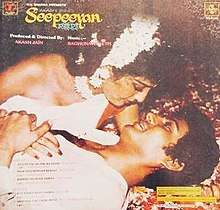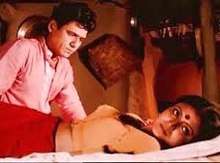Seepeeyan
Seepeeyan is a 1984 Indian drama film produced and directed by Akash Jain.[1][2][3] The film was edited by Venketesh Naik.[4] The film revolves around a woman who plunges into a river after her boyfriend refused to marry her, but is saved by another man of inferior caste whom she marries.[5] It stars Debashree Roy, Kanwaljit Singh and Om Puri in the leading roles.[6][7][8][4] The music of the film was composed by Raghunath Seth.[9]
| Seepeeyan | |
|---|---|
 | |
| Directed by | Akash Jain |
| Produced by | Akash Jain |
| Starring | Debashree Roy Kanwaljit Singh Om Puri Ranjeet |
| Music by | Raghunath Seth |
| Edited by | Venketesh Naik |
The film created ripples in the eighties due to its manifestation of the theme of pre-marital sex.[5] One of sequences of the film shows a handsome young man, played by Kanwaljit Singh making love to a beautiful young maiden, played by Debashree Roy. The role played by Roy was reviewed as a borrowed idea from Tess of the d'Urbervilles by Thomas Hardy as her character gets seduced and deceived by the male lead played by Singh.[10][11] The film got a mixed review from the critics and was a hit at box office.[12][13]
Plot
Kalyani is a young beautiful woman who falls in love with a young man named Jeetu. Jeetu confesses his love for Kalyani and promises her to be always by her side. Kalyani and Jeetu make love to each other. After her mother's death, Kalyani proposes to Jeetu to get married. Jeetu declares that he is not willing to spend the rest of his life with Kalyani. Kalyani feels like she has been deceived and loses all the yearning for her life. She plunges into a river they were standing beside and is drifted to somewhere else where a man named Gokul finds her unconscious on the surface of the water. Gokul brings her to his home and cures her well. Kalyani marries Gokul. Eventually Jeetu comes to know that Kalyani has been married to a man of an inferior caste. Jeetu meets her and confesses that he is contrite for what he told her earlier and now he wants her back in his life. He also tries to persuade her that she cannot spend the rest of her life with a man like Gokul who belongs to an indigent lower caste. Gokul overhears what Jeetu says to Kalyani and he tries to insist her to get back to Jeetu. But she holds her ground firmly. She declares that she has fallen for Gokul and is not willing to leave him at any cost. Gokul is overjoyed to have heard this and they embrace each other.
Cast
- Kanwaljit Singh as Jeetu
- Debashree Roy as Kalyani
- Om Puri as Gokul
- Ranjeet
Music
- " Aayenge Tere Dwar Maata" - Mahendra Kapoor
- "Jeevan Pal Do Pal Ka Saathi" - Anoop Jalota
- "Kya Kahen Kisse Kahen" - Bhupinder Singh
- "Main Titli Rango Ki Kali" - Alka Yagnik
- "O Badhau Na Mohe Dibiya" - Alka Yagnik[14]
Reception
The role played by Roy was reviewed as a borrowed idea from Tess of the d'Urbervilles by Thomas Hardy as her character gets seduced and deceived by the male lead played by Kanwaljit Singh.[15][10][11] Filmzack wrote: "Her role, somehow reminds us of Tess of the d'Urbervilles by Thomas Hardy, whose innocence is ripped apart by the debauched manhood."[11]

Roy gained mixed review for her performance. She was adulated for her gaze but criticised as well for her whimpering performance in some of the sequences especially when Kalyani learns her mother has passed away.[11][13]
Om Puri was applauded for his role in the film.[16] Filmzack wrote: "It's a real hard thing to find out a single rift in his performance and this time also, there is no exception."[11]
References
- "Seepeeyan (1986) | Hindi Movie Songs - Bollywood MuVyz". Seepeeyan (1986) | Hindi Movie Songs - Bollywood MuVyz. Retrieved 10 February 2018.
- "Seepeeyan (Celluloid) | Movies & Lyrics". movies.syzygy.in. Retrieved 27 January 2018.
- "SEEPEEYAN | British Board of Film Classification". www.bbfc.co.uk. Retrieved 10 February 2018.
- Francis Bridget (14 September 2016), || SEEPIYAN super Hot Promo love story ( Om puri & Debosree Roy), retrieved 15 November 2017
- Thoraval, Yves (1 February 2000). The cinemas of India. Macmillan India. ISBN 9780333934104.
- "Seepeeyan (1984) - Cinestaan.com". Cinestaan. Retrieved 15 November 2017.
- "Seepeeyan - One Movie Avenue". One Movie Avenue. Retrieved 15 November 2017.
- "Online Vinyl Shop, Vinyl Records For Sale Online, Buy Vinyl Record". www.onlinevinylshop.com. Retrieved 15 November 2017.
- "Raghunath Seth - Seepeeyan". Discogs. Retrieved 15 November 2017.
- "Bygone Stars of Eighties". www.koimoi.com. Retrieved 11 February 2018.
- "The Superlative Roy". Filmzack. 30 December 2017. Retrieved 11 February 2018.
- "Om Puri: The actor who never got his due". BBC News. 2017. Retrieved 15 November 2017.
- "Lesser Known Facts about Debasree Roy". filmsack. Archived from the original on 5 August 2017. Retrieved 11 February 2018.
- "Seepeeyan", Gaana.com, retrieved 10 March 2019
- Rajadhyaksha, Ashish; Willemen, Paul (10 July 2014). Encyclopedia of Indian Cinema. Routledge. ISBN 9781135943257.
- "Om Puri: His life, dreams, struggles and accomplishments in his own words - Entertainment News, Firstpost". Firstpost. Retrieved 10 February 2018.